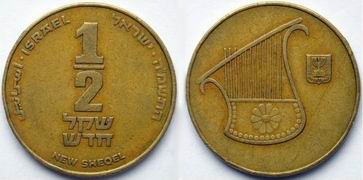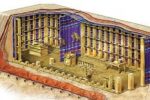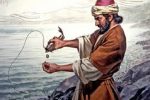THE MYSTERY OF THE FISHED COIN (part 1)

Modern day Half Shekel
In the Book of Matthew 17:27, “Notwithstanding, lest we should offend them, go thou to the sea, and cast an hook, and take up the fish that first cometh up; and when thou hast opened his mouth, thou shalt find a piece of money: that take, and give unto them for me and thee”, Jesus, on that day, did something I believe you have probably never heard until now, in this biblical exposition aimed at teaching the truth from the word of God. Amen.
It is apropos to commence this teaching from Matthew 17:24, “And when they were come to Capernaum, they that received tribute money came to Peter, and said, Doth not your master pay tribute?” In verse twenty-five, Jesus is quoted asking, “What thinkest thou, Simon? of whom do the kings of the earth take custom or tribute? of their own children, or of strangers?” Four times monetary terms are mentioned. Four being the scriptural number of creation points to an understanding that the Author of creationism was about to embark on the creation of a new thing i.e a new species of intelligent beings. The first amount of money to be mentioned is ‘tribute money’. The second is ‘custom’ and the third being ‘tribute’ while the fourth is ‘a piece of money’.
It was germane that Capernaum would host the event of the mystery of this coin. Capernaum comes from two words: kaphar (kaw-fawr’) ‘a village (as protected by walls)’ and Nachuwm (nakh-oom’) ‘comfortable’. The LORD of creationism had decided to lay the foundation of the protection His own people with divine comfortableness in the right place.
‘Tribute money’ has ‘money’ printed in italics, denoting that it was not in the original script. Italicized words were included, by the translators, to enhance proper understanding of the English readers of the Bible. The word ‘tribute’ in Greek comes from two words: [‘dis (dece): ‘twice’ and drachmē (drakh-may’): ‘a drachma, a Greek silver coin about the same weight as a Roman denarius’]. It is called didrachmon (did’-rakh-mon) meaning: ‘a double drachma, a silver coin equal to two Attic drachmas‘. The payment and collection of this didrachmon dated over a millennium back in the Book of Exodus 30:12-16. It is an equivalence of the Jewish half shekel coin. Verse 12, “When thou takest the sum of the children of Israel after their number, then shall they give every man a ransom for his soul unto the LORD, when thou numberest them; that there be no plague among them, when thou numberest them”. Where do you think the Mafia got its satanic extortionist system from? Definitely from the good, security intentioned, mind of Jehovah. The Israelites gave this tribute (not forcefully), for God’s perfect insurance policy in the protection of their lives. The instruction of verse 16, “And thou shalt take the atonement money of the children of Israel, and shalt appoint it for the service of the tabernacle of the congregation; that it may be a memorial unto the children of Israel before the LORD, to make an atonement for your souls”, shows that the tribute money is ecumenical. Half shekel (it has to do with 10 for 20 gerahs = 1 shekel) taking care the individual’s trial (10), is an intimation that no trial will overtake God’s, fully insured, child (spiritually). Are you born again? Then, you are fully insured by the Divine insurance policy.
 The next fiscal term is ‘custom’, and this is telos (tel’-os) which means: ‘end a. termination, the limit at which a thing ceases to be (always of the end of some act or state, but not of the end of a period of time) b. the end; the last in any succession or series 2. eternal c. that by which a thing is finished, its close, issue d. the end to which all things relate, the aim, purpose 2. toll, custom (i.e. indirect tax on goods)‘. In this context telos is about ‘indirect tax on goods’. Did Jesus instruct Peter to use the money to pay for the tax on goods imported into the land of Israel or exported out of the land by His ministry? Trust the word of God to possess answers to all nagging questions. The third term is ‘tribute’. This ‘tribute’ is kēnsos (kane’-sos): ‘in the NT the tax or tribute levied on individuals and to be paid yearly (our capitation or poll tax)‘. It is of Latin origin from which we have the English ‘census’ (among the Romans, denoting a register and valuation of property in accordance with which taxes were paid).
The next fiscal term is ‘custom’, and this is telos (tel’-os) which means: ‘end a. termination, the limit at which a thing ceases to be (always of the end of some act or state, but not of the end of a period of time) b. the end; the last in any succession or series 2. eternal c. that by which a thing is finished, its close, issue d. the end to which all things relate, the aim, purpose 2. toll, custom (i.e. indirect tax on goods)‘. In this context telos is about ‘indirect tax on goods’. Did Jesus instruct Peter to use the money to pay for the tax on goods imported into the land of Israel or exported out of the land by His ministry? Trust the word of God to possess answers to all nagging questions. The third term is ‘tribute’. This ‘tribute’ is kēnsos (kane’-sos): ‘in the NT the tax or tribute levied on individuals and to be paid yearly (our capitation or poll tax)‘. It is of Latin origin from which we have the English ‘census’ (among the Romans, denoting a register and valuation of property in accordance with which taxes were paid).
(To be continued…)
To read the part 2 click here
Visits: 239



